Sådan virker Cialis i kroppen
Cialis tages som en tablet og kommer i pakker af alt fra 2.5mg og op til 20mg. De mest almindelige er
Hovedpine
Rødme i https://danmarkpiller.dk/viagra-professional-uden-recept.html ansigtet
Ondt i maven
Svimmelhed
Synsforstyrrelser
Er du det mindste i tvivl om du kan tåle Viagra, så tal med din læge før du køber.
Chrome hand sockets and impact sockets have differences that run a lot deeper than simply impact sockets having a black finish and hand sockets having a shiny chrome look.
The real difference between impact sockets and chrome hand sockets happens during when the sockets are heat treated to different hardness levels. Impact sockets are typically made out of a medium carbon alloy steel that is heat treated to a low hardness range. You may see a lot of impact sockets stamped with Cr-Mo referring to the steel alloy being a Chrome Alloy or Chromoly (aka Chrome-Molybdenum). Compare that with chrome hand sockets, which are also made from a medium carbon alloy steel but are heat treated to a much higher hardness range. Usually, chrome sockets are made from Chrome Vanadium (stamped Cr-V) which is a different steel alloy mixture which gives added hardness. However, as I will show you, companies are producing impact sockets with both chrome vanadium and chrome molybdenum alloys. Typically, the cr-mo impact sockets are more expensive and will hold up better over time, however as long as a socket is designed for impact use, it should be heat treated correctly and safe to use on impact guns. Impact sockets can be used, worry-free, all day on hand tools, however, chrome sockets should never be used with impact guns.
Many modern automotive mechanics simply use impact sockets on both their hand tools and their impact wrenches/guns. Especially if the auto-mechanic is working flat-rate and trying to be as efficient as possible, there is no need to switch back and forth from chrome to impact if you can fit the impact socket on the fastener. This is because modern impact sockets are not nearly as thick walled and heavy as their older counterparts. Chrome sockets still have their place, but if you’re a DIY automotive mechanic or entry-level technician focus on filling out your impact sockets first.
Table of Contents
Difference between chrome sockets and impact:
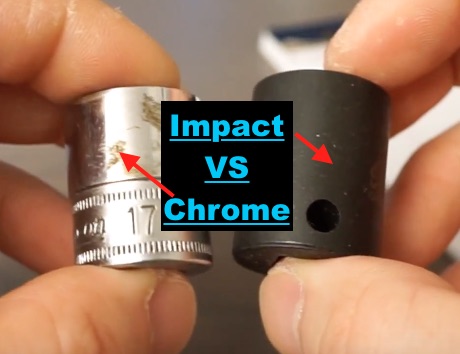
- Impact Sockets are heat-treated differently than chrome sockets to allow them to be used with torque guns. They are typically less hardened and softer.
- Chrome sockets are usually made from a harder alloy of steel (CR-V) and heat-treated to a higher hardness.
- Impact sockets can be used on hand tools.
- Chrome Sockets are rigid causing anvil wear on air or cordless impact wrenches. Impact sockets are less hard and absorb blows. You can think of impact sockets as being designed to withstand significant jolts of power, whereas chrome sockets are made for hand torque applied (much slower and more consistent).
- Chrome sockets should never be used on high-torque impact guns or wrenches.
- Chrome hand sockets are coated in chrome which is better at protecting against rust, however, the chrome plating would immediately flake off if used with torque wrenches consistently.
- Chrome sockets can shatter or blow up if used improperly on high-torque impacts.
- Impact sockets will be made from CR-MO (Chrome Molybdenum) or CR-V (Chrome Vanadium) but will never come with a chrome plating or finish.
- Most more expensive impact sockets are made from CR-MO. It is an alloy that is PERFECT for impact sockets and will last a long time.
- Impact Sockets were typically much thicker and heavier than their chrome hand tool socket comparisons. However, modern impact sockets are typically very close in size and weight to chrome sockets. Therefore, buying impact sockets first is best for the beginner/entry-level mechanic.
- There is a lot of marketing involved with sockets, describing the alloys, and the finish. However, many companies do not need to disclose the actual alloy used, and therefore it is impossible to tell the quality of the socket simply by what steel they say it is made from/finished with.
- Stick with impact and chrome sockets that have good reviews, come with a lifetime warranty, and a brand where you won’t be stuck waiting months for a warrantied socket.
Most impact sockets have thicker walls and are finished in a black phosphate or black oxide finish. Some impact sockets also come with a cross hole in the handle end for use with a retaining pin and ring or locking pin anvil. This allows the impact socket to be securely attached to the square drive of an impact gun. The beauty of newer modern impact sockets is that they are not nearly as thick and heavy as some of the older impact sockets were. Many professional technicians simply own only impact sockets and find them to work perfectly well with their hand tools. That way you do not need to buy two complete sets of the same sockets in chrome and impact anymore.
A lot of impact sockets come with what is referred to as an “industrial finish” which means a dull black finish. This is both used as a way to know whether a socket is an impact when you’re looking through your toolbox, and to protect the socket from corrosion. Chrome sockets will quickly lose their plating under the vibration and impact of being used as an impact socket.
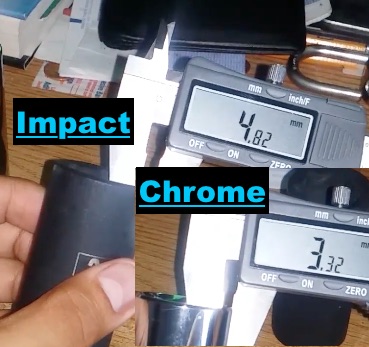
What Are Impact Sockets Made Of?
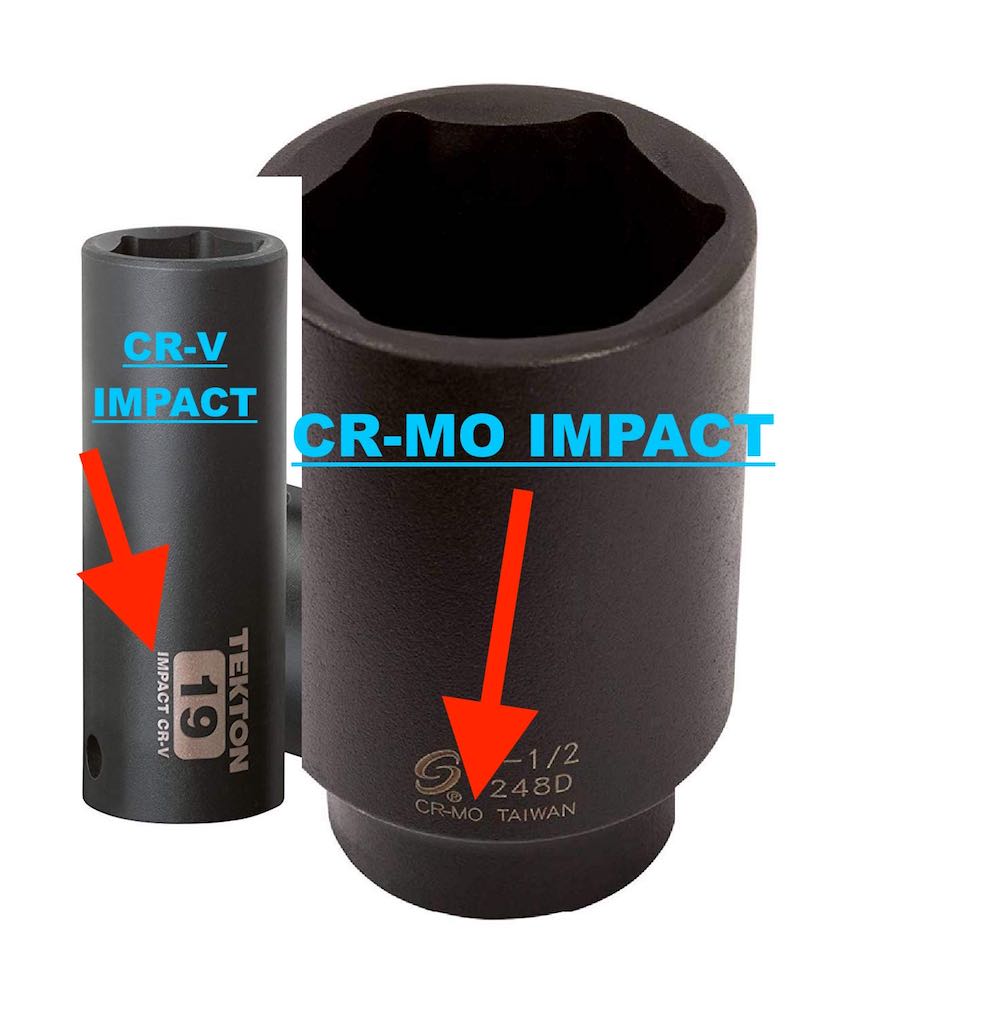
This depends on the manufacturer and the model of impact sockets we are discussing. There is no rule that impact sockets are made of a certain alloy and chrome sockets of another. It is a myth that all high-quality impact sockets will be made from chrome molybdenum. It typically has to do more with the heat treatment “drop-forging” done to the socket to make it either a harder finish or a softer finish. Impact sockets are softer and can handle high-torque repeated impacts better. Chrome sockets are harder and more durable, but also more brittle and can explode under high-torque applications.
To read more all about the different alloys of steel including CR-MO and CR-V click here. I guarantee you it is a lot more confusing and complicated than simply CR-MO are better impact sockets than CR-V. However, I do suggest buying a high-quality CR-MO impact socket set if you’re planning on using your impact sockets often. They seem to be more expensive and have better reviews for holding up well over time.
It is also true that most chrome hand sockets are predominantly made of chrome vanadium steel. While, impact sockets are, typically, made of chrome molybdenum. However, no company needs to specify exactly what blend of alloy they are using for their chrome or impact sockets, so there is no point in trying to base quality of an impact socket based on the alloy they list on their website.
For example, Snap-On says this about their impact sockets “Snap-on® uses a proprietary blend of special alloy socket steel that provides long life and great strength.” Or take Matco impact sockets for another example, they say on their website that their impact sockets are made of “…High-strength alloy.“ It is not true that all quality impact sockets are made from chrome molybdenum, it has much more to do with the heat treatment process and the quality of the manufacturer. I highly recommend only buying impact sockets which come with a lifetime warranty.
What is Better to Buy Impact Sockets or Chrome Sockets?
The real answer is that there are benefits to both. However, with the invention of many impact sockets that are thin walled and come with a lifetime warranty, many technicians have switched over to only buying impact sockets. You can always use impact sockets on hand wrenches, but never vise-versa. If you are a DIYer or entry-level technician I highly recommend starting out buying high-quality impact sockets first then filling in with chrome hand sockets as you go. Make sure the impact sockets you are getting are thin walled and come with a lifetime warranty.
Here is a guy who works all day on cars explaining why he typically uses impact sockets all day at his job. He works flat-rate and every second counts for him, no point in switching back to chrome sockets if he doesn’t need to.
What are the pros to hand sockets vs. impact sockets?
Hand sockets typically have thinner walls, look nicer to the eye (if you like shiny chrome,) and are less likely to rust over time. Because chrome sockets typically are thinner than their impact socket cousins, they are perfect for super tight spaces.
For example, some impact sockets will have trouble fitting down into a spark plug hole. Hand sockets also look nicer visually to the eye with the chrome plating. They also are more durable if used only with hand tools and will likely offer you a longer lifespan than impact sockets alone would. That being said with so many sockets these days coming with lifetime warranties you are okay either way.
Voided Warranty on Chrome Sockets Used On Impact Wrenches:
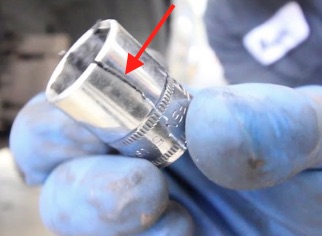
Using chrome sockets made for hand use only on impact wrenches not only increases the risk of injury but also can lead to problems if you break a chrome socket and try to warranty it. Snap-On and other big name tool companies will reject you if they see obvious signs the socket broke on an impact wrench. Some signs of a chrome socket that was used on an impact wrench include cracks around the wrench end and distortion around the square drive end. Chrome sockets, because of their hardness, will also damage the drive end of your impact wrench. As a rule of thumb, do not use your chrome sockets, or hand sockets, ever on any impact wrench. If the fastener is already loose and you are just trying to zip it out, then you can use chrome sockets. However, it is best to be safe than sorry, as many mechanics have seen chrome sockets shatter or blow up when used on impact guns at high-torque values.
Impact Sockets Are Better At Breaking Loose Stuck Bolts:
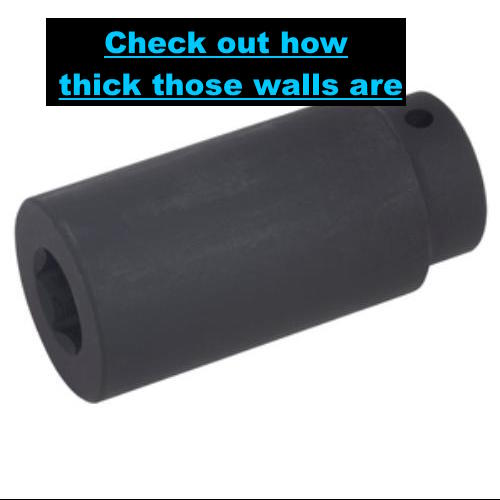
This has to do with the rules of Physics. Impact sockets tend to have more mass. The impact gun is able to use that extra mass in its favor to help break super tight fasteners loose. The more mass the impact socket has, the more force it can put against the fastener. Take for example this socket made to take off super tight Honda crankshaft pulley bolts. The walls of the socket are like 3x thicker than a standard impact socket, making it more massive (heavier) and able to bust super tight bolts lose with no change in the impact wrench or gun.
What are power sockets?
There are some sockets that have a black finish, like most impact sockets, but are stamped with something like “WARNING: NON-IMPACT.” Power sockets are not made to be used with impact guns or wrenches. Power sockets are heat treated to a higher hardness than either impact or hand sockets. This high hardness, combined with thick socket walls, produces a strong, wear resistant socket. The power socket is, therefore, ideal for assembly lines where it will see a lot of use but no high torque stresses.
Conclusion:
Chrome sockets, or non-impact sockets, should only be used with extreme caution on impact guns and wrenches. When a chrome socket breaks under extreme torque of an impact gun it can literally explode sending metal pieces flying. Impact sockets are made to wear under the high torque of an impact gun, and will not explode if they do break.
Improperly using hand sockets on impact tools is hazardous. Most of us have all done it at some point out of laziness or lack of the correct socket. However, using chrome sockets on impact tools is not worth the risk. Especially with impact guns becoming exponentially more and heavier hitting. Milwaukee’s m18 high-torque impact gun that I use and love has breakaway torque up to 1600ft-lbs. That is a lot of force, and enough to break a chrome socket. By knowing the difference between the various types of impact/chrome sockets you will be a safer DIY mechanic.
To read a complete list of all the tools you will need as a beginner mechanic click here, I compiled lists from multiple automotive technician schools and from my own experience.
To read about my favorite hand socket chrome set click here, or to read about my favorite cordless impact wrench click here.
Related Questions:
Question: Can using chrome sockets on impact wrenches/guns cause damage to my wrench?
Answer: Yes, using chrome sockets on an impact wrench or impact gun can cause damage to the anvil head of the wrench. This is because chrome sockets are much harder and do not give or warp when being impacted. Impact sockets, however, will wear slightly and also absorb some of the impact and not deform the impact guns anvil head. Plus, it is dangerous to use chrome sockets on impact wrenches anyways (they are more likely to explode under the high-torque).
Question: What is drop forging and are sockets drop forged?
Answer: From my research sockets are either drop forged or cold forged. This helps make the socket stronger, by aligning all the atoms in the metal. It is a complicated process, and you can read more about it here. However, the main point I gathered is that drop-forging makes the steel stronger and is perfect for making sockets/ratchet bodies etc.
Question: How are Sockets Made?
Answer: They go through a process involving many steps including heat treatment and plating which is the big difference between chrome sockets and impact sockets. Watch this video here to see how Snap-On sockets are made from start to finish. The sockets in the video being made are hand chrome sockets.
Top Impact Socket Sets:
You are probably wondering what I would recommend buying for impact sockets. I have done a ton of research to write this article and have found some awesome deals for impact sockets online that you should check out. These all come recommended by professional mechanics that have used these sets for years without problems. They also all come with lifetime warranties which is ABSOLUTELY essential if you’re going to be buying impact sockets.
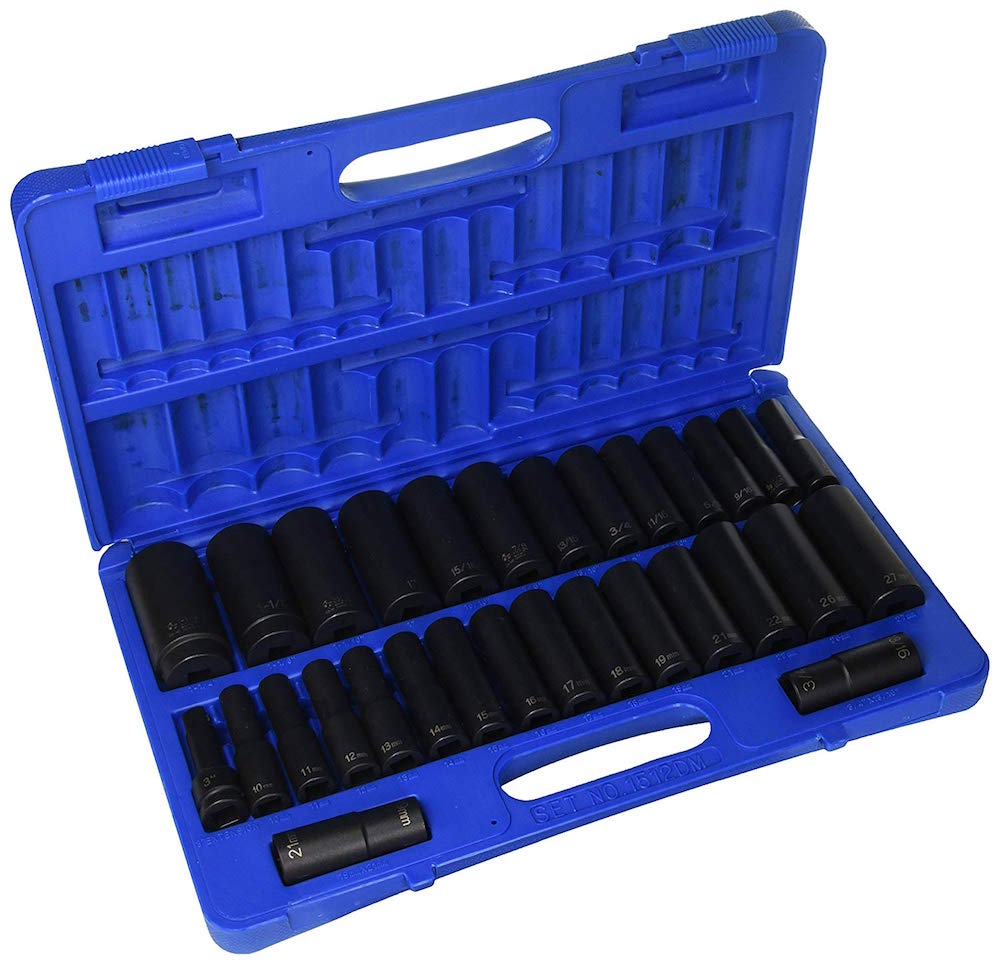
First, you’re going to need a good set of deep impact sockets for everything from lug nuts to suspension bolts. A mechanic pointed me to these grey pneumatic 1/2″ deep impact sockets, which come with both SAE and Metric sockets and all the common sizes. Plus it has its own carrying case and is PERFECT for everything car repair related.
Next, you are going to want to have some metric swivel sockets. Trust me, you will use these all the time. There are so many times you can’t fit a regular socket on a fastener, but also want to be able to remove it fast with your impact gun. Check out this awesome Sunex 2665 1/2-Inch Drive Metric Universal Impact Socket Set on Amazon for a killer deal.
You can also read my post on all the tools you are going to need to get started doing automotive repair here. I also wrote another post where I did a TON of research on the best impact guns here.
Fun listen– I called Matco tools and asked them the difference between impact and chrome sockets. Here is what their representative told me and the conversation we had (very short 2min call).

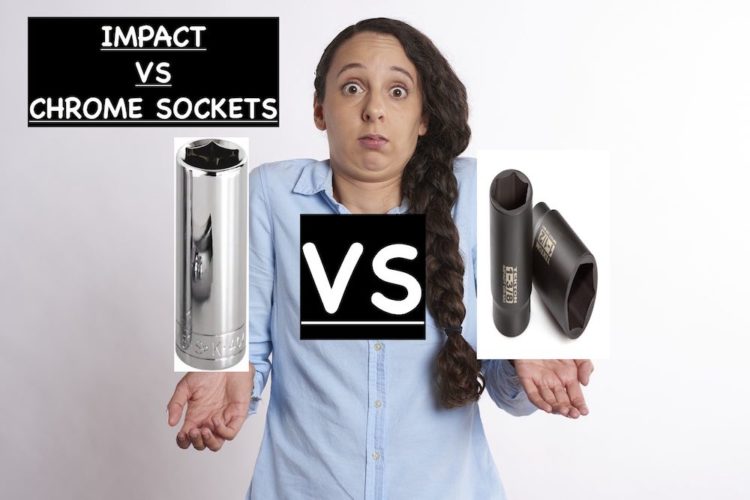
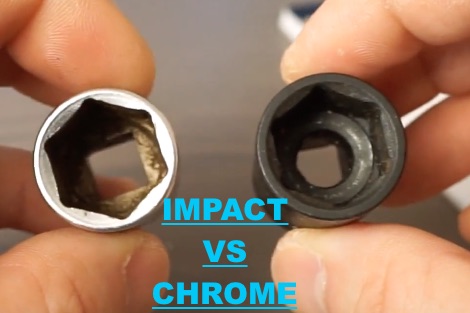
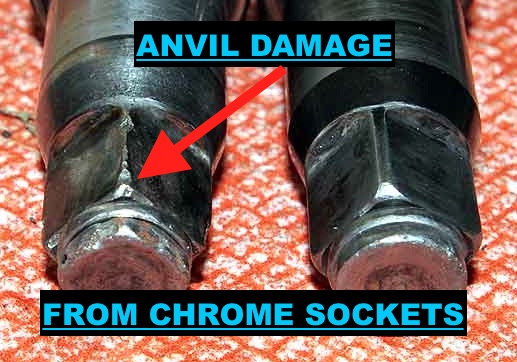




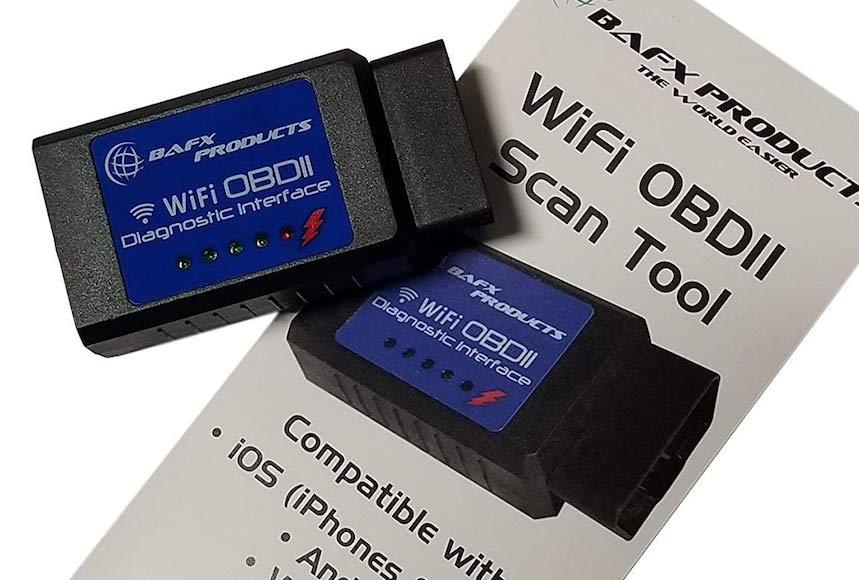
We are using impact socket, but still it breaks for 195Nm. Hardness of socket 42-45HRc. What will be the reason.?
To Kalai: what size drive are you using? You must remember that the metal strength is measured in psi, and torque in ft-lbs. So, for example with a 1″ drive:
1 ft-lb of pressure = 12 in-lb = 12 lb * 1in. The drive size is 1×1 inch, so you’re applying 12lbs of pressure across 1 in^2, so 12 psi.
On the other hand, with a 1/2″ drive:
1 ft-lb of pressure = 24lb * .5 in. The drive is .5x.5 inch, so you’re applying 24lbs of pressure across .25in^2, so 96psi.
The tensile limit of CrMo starts at approximately 63000psi, depending on the model:
https://www.makeitfrom.com/material-properties/SAE-AISI-4130-SCM430-G41300-Cr-Mo-Steel
The breaking force you named is roughly 144ft-lb. Converting 63000psi to 144ft-lb, this yields 437.5psi per ft-lb. This tells me that you’re using either a 3/8″ or a 1/4″ drive.
This is the reason that it breaks. Upgrade to a socket with a bigger drive.
To the author: wow, pretty complete article given your conversation on the phone. One thing that gp says, though, is:
Only use impact sockets with power driven or impact tools. Do not use impact sockets with hand tools such as ratchets, breaker bars, leverage bars or torque multipliers.
(Safety Warning No. 2)
Note that this is the opposite of what the guy on the phone said. Do you have an idea why this might be? (could be a typo, too.) If not, I think I’ll call them and find out.
I really can’t think of any reason– at all– that you could not use impact sockets with ratchets or breaker bars. In fact, I would say that no mechanic has ever had a problem with that. It might be that they are softer and therefore more likely to “round” but that does not happen often (if at all) that anyone has noticed (in my experience).